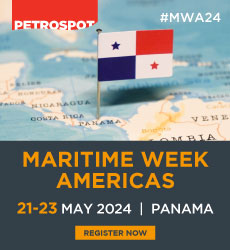Invited by Bunkerspot to share their expectations for the 80th meeting of the Marine Environment Protection Committee (MEPC 80), climate NGOs said that last week’s Intersessional Working Group on Reduction of GHG Emissions from Ships (ISWG-GHG 15) ‘didn’t conclude in a way that would address the shipping sector’s emissions fully’ and progress at yesterday’s opening sessions of MEPC 80 was ‘frustratingly slow’. However, they added that there is ‘still hope to protect the global climate and vulnerable communities around the world’ and they have their ‘fingers crossed’ that progress may be being made behind the scenes.
Ana Laranjeira, Shipping Manager with Opportunity Green, called for a major effort to keep shipping aligned with the UN climate action objectives: ‘This week will be the critical moment for determining whether the IMO is able to keep the Paris Agreement goal of 1.5°C alive. This is not just about meeting a target, it's about the livelihood of the world's most climate vulnerable countries and the protection of our world's biodiversity. Yet, you wouldn't know that from the outcome of the ISWG-GHG 15 meetings last week – with no agreement reached on emission targets; watered-down language on the fair, just, and equitable transition; and a lack of inclusivity of climate vulnerable countries in some of the key discussions.
‘There was some small progress last week, which needs to be acknowledged and celebrated. But this is no longer the time for small progress when it comes to climate action. This is the last chance to set the shipping sector on a 1.5°C-aligned pathway, and to ensure a fair, just and equitable transition that leaves no one behind. Until the closing of MEPC 80, I remain cautiously hopeful.’
Sam Yarrow-Wright, Policy Manager, Global Shipping at Environmental Defense Fund, told Bunkerspot: ‘While last week’s negotiations didn’t conclude in a way that would address the shipping sector’s emissions fully, there is still hope to protect the global climate and vulnerable communities around the world.
‘We know shipping can – and must – decarbonise rapidly to limit the increase of global temperatures beyond 1.5 degrees Celsius. Countries have the opportunity to secure a green future for their people and economies by committing to eliminating emissions on a well-to-wake basis by no later than 2050, by supporting intermediate targets of 37% emissions reductions by 2030 and 96% by 2040, and by including a basket of practical measures, such as a market-based mechanism and a fuel standard.
‘This discussion shouldn’t be about politics, but about the future of communities and ecosystems around the world.’
Dr Sian Prior, lead advisor to the Clean Arctic Alliance, commented: ‘The first day of MEPC 80 was frustratingly slow. It started with a powerful pre-recorded address from the UN Secretary General António Guterres urging IMO Member States to back a science-based 2030 target to reduce their GHG emissions and on the use of clean fuels, and to support a global shipping levy.
‘Interventions continued with a wake-up call from the UNFCCC – the carbon budget to stay on track for 1.5°C will soon be exhausted, a low ambition pathway will compromise our ability to meet our Paris commitments, to limit global warming to 1.5°C rapid, deep and immediate emissions reductions are needed across all sectors of the global economy.
‘The shipping sector needs to be aligned with net zero by 2050 and this means it needs clear plans with interim targets to get there. To achieve this we must “do all that you can”. The rest of the day was taken up with Member State statements – many powerful and some disappointing with everything in between. No progress however in terms of the decision-making process. Frustrated at the lack of progress, Poseidon himself made an appearance at the traditional Secretary General’s first day reception.
‘However, we start Day 2 however having made no progress, or perhaps - fingers-crossed - there has been some progress behind the scenes.
‘For the Clean Arctic Alliance, one of the frustrations is that emissions of black carbon from ships are not even being considered as part of the greenhouse gas strategy despite, being a short-lived climate forcer, and despite being one of those “Do all that you can” things that can be done now and with immediate effects. A switch to distillate or other cleaner fuels by ships operating in and near to the Arctic would reduce black carbon emissions by around 44%. It’s a fuel choice that can be done now – availability of cleaner fuels is not a problem. It’s low-hanging fruit!’
Taking place at the IMO Headquarters in London all this week, MEPC 80 is expected to see the adoption of IMO’s Revised GHG Strategy.














